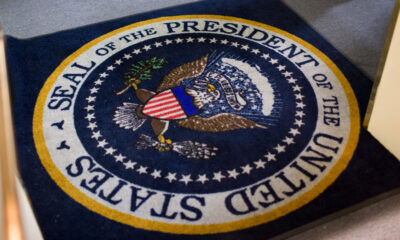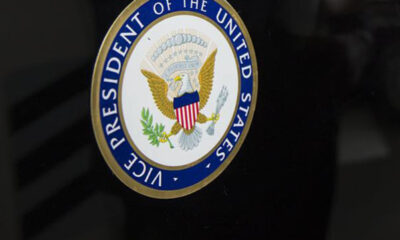Constitution
What can a President do?
A President has limited authority. Some Presidents have taken criticism for refraining from exceeding it. Other Presidents have neglected it.
Today, of course, is the third anniversary of an event that currently divides America between critics and worshipers of government. In fact it was a false-flag pseudo-operation to excuse persecuting half the country, in the eyes of the other half. Last night the installed President made a speech at Valley Forge, Pennsylvania, to “commemorate” that event. He sounded many of the same themes he sounded on September 2, 2022. Of the particular content of last night’s speech, the less said the better. What does need saying is what the Constitution lets a President do, for the edification of those who constantly cry out to a President to “do something” about a dire situation.
Powers and duties of a President
Article II of the Constitution sets forth the powers and duties of a President of the United States. Article IV sets forth the duties of the federal government to the States. No other part of the Constitution treats Presidential powers and duties. Amendment XII treats Presidential elections in detail, and Amendments XX and XXV treat Presidential regular and emergency secession, respectively. Amendment XXII sets a limit on Presidential terms of service. Further, Amendments XIV, XXIII and XXIV indirectly treat Presidential elections. But no other Amendment, or section of an Amendment, specifically begins, “The President shall have power…”
Specific statements
The specific enumerated powers and duties of a President are these:
- Commander-in-chief of the armed forces (and of any State militia called into federal service). But, only Congress may declare war or call up the militia.
- “Require” written reports from Cabinet members.
- Grant reprieves and pardons for federal offenses, except in cases of impeachment.
- Make treaties, with the concurrence of two-thirds of the Senators “present.”
- Nominate and, with Senate approval, appoint:
- Ambassadors, other “public ministers,” and consuls,
- Judges of the Supreme Court, and
- Any other officer whose appointment is established either in the Constitution or by law. (A Cabinet officer may appoint his inferior directly, if Congress grants him that authority.)
- Make recess appointments.
- Summon Congress into emergency session.
- Adjourn Congress on his own authority if the two chambers cannot agree on adjournment.
- Receive foreign diplomats.
- “Take care that the laws be faithfully executed.”
- “Commission all … Officers of the United States.”
Federal duties to the States
The Article IV duties are the most controversial today, given the inattention to many of them by this President. Section Two has two clauses relevant today:
- The Privileges and Immunities Clause, which predates Amendment XIV. Amendment XIV Section 1 reinforces Article IV Section 2 Clause 1; it does not supersede it.
- The Extradition Clause.
Section 2 had a third clause providing for the extradition of runaway slaves. Amendment XIII, of course, supersedes that.
Section 4 sets forth a duty of the federal government to “guarantee to every State in this union a republican form of government.” In addition the federal government must protect each State from:
- Invasion of any kind, and:
- Domestic violence, if the State legislature (or its governor if the legislature cannot convene) asks for such intervention.
The duties of a President to the States derive from Article IV Section 4. Therefore a President may not send troops into an American city (other than in a non-State territory) whenever he pleases. A President may so act only to:
- Eject a foreign invasion force, however constituted, or:
- Quell or prevent riots, if the legislature (or the governor if the legislature cannot convene) so requests.
Note that the word emergency never appears in the Constitution. The most it contains are definitions, like “in such imminent danger as will not admit of delay.”
When a President exceeds his authority
Custom – and sloppy thinking – have, sometimes, extended the powers of the President beyond those which the Constitution enumerates. The existence of the Federal Emergency Management Agency has given many the impression that a President may indeed send troops to American cities (within States) whenever he pleases. Furthermore, legacy media have often criticized a President for failure to act, even when no State legislature or government has authorized him to act.
The landfall of Hurricane Katrina in 2005 is a case in point. When George W. Bush did not send federal troops or other first responders at once, entertainer Kanye West famously said, “George Bush doesn’t care about black people.” In fact, Gov. Kathleen Blanco (D-La.) didn’t ask until several days after the event. Not only that, but she actively hampered the federal response when it came. She did not seek re-election when her term ended. More to the point: never once did Louisiana’s legislature pass any joint resolution asking for federal aid.
A federal response to a great storm, flood, or other such event, might find justification in the Domestic Violence clause. Looting and rioting are almost predictable consequences of a disaster that hampers, or severely strains, local police and other response. But a sloppy custom has arisen that a governor may “declare an emergency” without even trying to convene the legislature. Yet George W. Bush came in for criticism, essentially for staying within the limits of Presidential authority.
Applicability to recent events
President Donald J. Trump has had many accuse him of acting, or wishing he could act, like a dictator. Specifically that would mean exceeding his lawful authority in domestic-violence contexts. Yet never once did he send troops into American cities to quell riots during the “Long Hot Summer of 2020.” He didn’t send them because neither governor nor legislature in the States involved, asked. (Federal buildings are on federal land by definition, so any protection of those assets would be within Presidential authority. See Article I Section 8 Clause 17b.)
The Congress shall have power … To exercise exclusive Legislation in all Cases whatsoever, … over all Places purchased by the Consent of the Legislature of the State in which the Same shall be, for the Erection of Forts, Magazines, Arsenals, dock-Yards, and other needful Buildings.
“Federal buildings” house federal courts, which the Constitution permits. (Article III.) But other than that, the Legislatures and Governors of Oregon, Washington, Minnesota, and Wisconsin never “applied” for “protection … against domestic violence.” Riots in Kenosha, Wisconsin drew a militia response, including some militia effectives from out-of-State. One such effective, Kyle Rittenhouse, faced prosecution after he killed two rioters in self-defense. (A jury eventually acquitted him, when testimony established that he did not “start the fight.”)
Domestic violence is often the perfect excuse for dictators to “dictate.” The Framers understood that, and therefore enjoined the federal government from acting against it except whenever a legislature or governor asks. No President can do that which the government itself may not.
Dereliction of Presidential duty on the other side
On the Democratic side, we see dereliction of Presidential duty. Part of the problem is that the Constitution does not define invasion. It says a State may “engage in war [if] actually invaded,” and obligates the federal government to protect against “invasion.” But it never says what constitutes an invasion.
The American Heritage Dictionary defines invasion thus:
1. The act of invading, especially the entrance of an armed force into a territory to conquer.
2. The entry into bodily tissue and subsequent proliferation of an injurious entity, such as a pathogen or tumor.
3. An intrusion or encroachment.
4. In phytogeography, the phenomenon of the movement of plants from an area of one character into one of a different character, and their colonization in the latter.
5. The act of invading a country or territory as an enemy; hostile entrance or intrusion.
6. A harmful incursion of any kind; an onset or attack, as of disease.
7. Infringement by intrusion; encroachment by entering into or taking away what belongs to another: as, an invasion of one’s retirement or rights.
8. The act of invading; the act of encroaching upon the rights or possessions of another; encroachment; trespass.
9. A warlike or hostile entrance into the possessions or domains of another; the incursion of an army for conquest or plunder.
Likewise it defines the verb to invade thus:
1. To enter by force in order to conquer or pillage.
2. To enter as if by invading; overrun or crowd.
3. To enter and proliferate in bodily tissue, as a pathogen.
By those definitions, when migrants swarm into a country without doing its officers any of the courtesies one expects of an invited guest, that constitutes invasion. An invasion does not require an “armed force.” It does not even require such a force, if present, to wear a uniform. Given the mendicancy of these migrants, and their desire for handouts, their entry constitutes an “infringement by intrusion.”
But not only has President Biden failed to “protect against invasion,” but he is actively forbidding and otherwise hampering the efforts of some States to repel this invasion. He has sued the State of Texas to enjoin it:
- From maintaining a riparian barrier to entry along the Rio Grande, and
- To allow federal agents to degrade a physical barrier which the State has erected along riverfront property lines – with the consent of the landowners.
And now that Texas’ legislature has authorized all law-enforcement officers to arrest these migrants, the federal government threatens to sue to enjoin them from that as well.
A former President responds
President Trump held President Biden’s Valley Forge speech up to ridicule, according to Cassandra McDonald at The Gateway Pundit.
He would do better to point out that he never exceeded his lawful authority. Biden, on the other hand, has abused his discretion as to his authority. (Also that “democracy” is two wolves and a lamb voting on what’s for dinner. And now “democracy” would appear to be two wolves stopping the lamb from voting,then voting on what’s for dinner.)
If the American people are to remain free, they must insist that their President respect the limits of his authority – and also exercise his duty and responsibility. Biden has exceeded the one and failed at the other; Trump has done neither. The choice for voters is therefore crystal clear.
Terry A. Hurlbut has been a student of politics, philosophy, and science for more than 35 years. He is a graduate of Yale College and has served as a physician-level laboratory administrator in a 250-bed community hospital. He also is a serious student of the Bible, is conversant in its two primary original languages, and has followed the creation-science movement closely since 1993.
-

 Education4 days ago
Education4 days ago‘Grading for Equity’: Promoting Students by Banning Grades of Zero and Leaving No Class Cut-Ups Behind
-
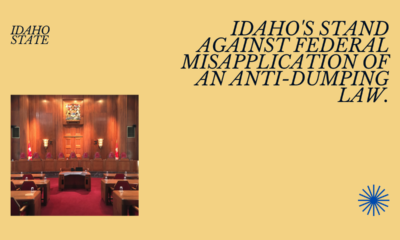
 Family3 days ago
Family3 days agoIdaho defends against abortion mandate
-
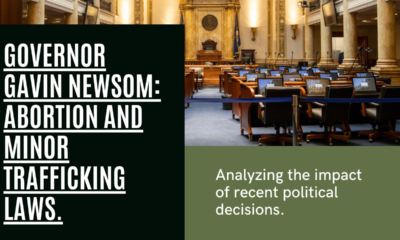
 Civilization4 days ago
Civilization4 days agoNewsom plays silly abortion politics
-
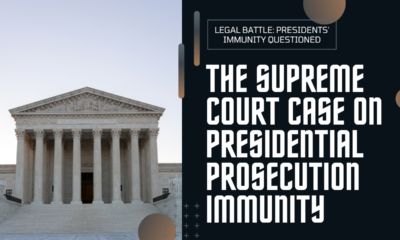
 Constitution2 days ago
Constitution2 days agoPresidential immunity question goes to SCOTUS
-

 Education23 hours ago
Education23 hours agoCHAPTER 11: Critical Race Theory: A Species of the Ideological Thought Genus Marxism
Space Is No Longer the Final Frontier—Reality Is [forthcoming release May 2024] -

 Civilization5 days ago
Civilization5 days agoWaste of the Day: China Still Owes Over $1 Trillion to American Bondholders
-
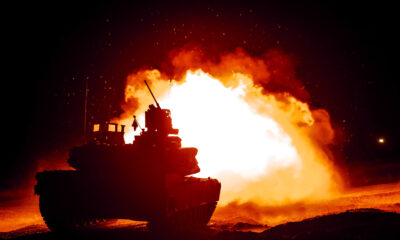
 Civilization5 days ago
Civilization5 days agoCurrent Conflicts Demonstrate Need for More and Better Tanks In Eastern Europe
-

 Civilization3 days ago
Civilization3 days agoMarine Corps Force Design: In Defense of Chowder II





